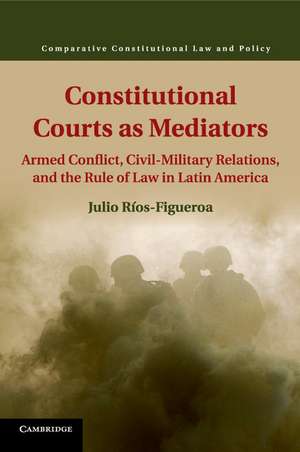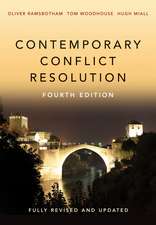Constitutional Courts as Mediators: Armed Conflict, Civil-Military Relations, and the Rule of Law in Latin America: Comparative Constitutional Law and Policy
Autor Julio Ríos-Figueroaen Limba Engleză Paperback – 10 mai 2017
| Toate formatele și edițiile | Preț | Express |
|---|---|---|
| Paperback (1) | 283.25 lei 6-8 săpt. | |
| Cambridge University Press – 10 mai 2017 | 283.25 lei 6-8 săpt. | |
| Hardback (1) | 724.45 lei 6-8 săpt. | |
| Cambridge University Press – 14 apr 2016 | 724.45 lei 6-8 săpt. |
Din seria Comparative Constitutional Law and Policy
-
 Preț: 439.01 lei
Preț: 439.01 lei -
 Preț: 293.64 lei
Preț: 293.64 lei -
 Preț: 367.67 lei
Preț: 367.67 lei - 14%
 Preț: 739.13 lei
Preț: 739.13 lei -
 Preț: 280.49 lei
Preț: 280.49 lei -
 Preț: 206.78 lei
Preț: 206.78 lei -
 Preț: 236.43 lei
Preț: 236.43 lei -
 Preț: 206.78 lei
Preț: 206.78 lei - 9%
 Preț: 660.83 lei
Preț: 660.83 lei -
 Preț: 178.97 lei
Preț: 178.97 lei - 9%
 Preț: 696.10 lei
Preț: 696.10 lei -
 Preț: 289.74 lei
Preț: 289.74 lei -
 Preț: 238.36 lei
Preț: 238.36 lei -
 Preț: 201.19 lei
Preț: 201.19 lei -
 Preț: 238.11 lei
Preț: 238.11 lei - 9%
 Preț: 695.79 lei
Preț: 695.79 lei -
 Preț: 319.99 lei
Preț: 319.99 lei -
 Preț: 248.39 lei
Preț: 248.39 lei -
 Preț: 358.66 lei
Preț: 358.66 lei -
 Preț: 283.03 lei
Preț: 283.03 lei -
 Preț: 358.48 lei
Preț: 358.48 lei - 14%
 Preț: 742.60 lei
Preț: 742.60 lei - 14%
 Preț: 727.91 lei
Preț: 727.91 lei - 23%
 Preț: 640.09 lei
Preț: 640.09 lei - 14%
 Preț: 721.78 lei
Preț: 721.78 lei -
 Preț: 267.18 lei
Preț: 267.18 lei -
 Preț: 284.56 lei
Preț: 284.56 lei -
 Preț: 321.31 lei
Preț: 321.31 lei -
 Preț: 385.61 lei
Preț: 385.61 lei -
 Preț: 286.89 lei
Preț: 286.89 lei -
 Preț: 356.75 lei
Preț: 356.75 lei - 23%
 Preț: 705.36 lei
Preț: 705.36 lei - 14%
 Preț: 723.27 lei
Preț: 723.27 lei -
 Preț: 322.29 lei
Preț: 322.29 lei -
 Preț: 358.48 lei
Preț: 358.48 lei
Preț: 283.25 lei
Nou
Puncte Express: 425
Preț estimativ în valută:
54.21€ • 58.86$ • 45.53£
54.21€ • 58.86$ • 45.53£
Carte tipărită la comandă
Livrare economică 23 aprilie-07 mai
Preluare comenzi: 021 569.72.76
Specificații
ISBN-13: 9781107439122
ISBN-10: 1107439124
Pagini: 254
Ilustrații: 13 b/w illus. 7 tables
Dimensiuni: 150 x 230 x 15 mm
Greutate: 0.35 kg
Editura: Cambridge University Press
Colecția Cambridge University Press
Seria Comparative Constitutional Law and Policy
Locul publicării:New York, United States
ISBN-10: 1107439124
Pagini: 254
Ilustrații: 13 b/w illus. 7 tables
Dimensiuni: 150 x 230 x 15 mm
Greutate: 0.35 kg
Editura: Cambridge University Press
Colecția Cambridge University Press
Seria Comparative Constitutional Law and Policy
Locul publicării:New York, United States
Cuprins
1. Constitutional courts and the armed forces; 2. A theory of constitutional courts as mediators; 3. Constitutional jurisprudence on military autonomy in Colombia, 1958–2013; 4. Constitutional jurisprudence on military autonomy in Peru, 1979–2013; 5. Constitutional jurisprudence on military autonomy in Mexico, 1917–2013; 6. Judicial regulation of the use of force in Colombia, Peru, and Mexico; 7. Constitutional courts as mediators beyond Latin America; 8. Constitutional courts and democratic conflict-solving.
Recenzii
'Combining a sophisticated approach to institutional theory with compelling case studies of the effects of constitutional courts on civil-military relations in Latin America, Julio Ríos-Figueroa achieves the uncommon - he changes the way that we think about both civil-military relations and the role of constitutional courts in the twenty-first century. It is a powerful example of how theory and empirics should be combined in studies of law and courts.' Jack Knight, Duke University, North Carolina
'As soon as I finished Constitutional Courts [as Mediators], I cited it in two papers, neither of which had anything to do with Latin America or the military. Ríos-Figueroa's arguments and findings are that universal - and that important to the study of law and legal institutions. On top of it all, Ríos-Figueroa is such a terrific, accessible writer that Constitutional Courts [as Mediators] should find an audience with social scientists and members of the legal community. No doubt, both would benefit from his insights.' Lee Epstein, Washington University, St Louis
'In this book, Julio Ríos-Figueroa skilfully demonstrates that when constitutional courts are independent, accessible and powerful, they can act as creative judicial mediators, helping to resolve conflicts between militaries and civilian governments by reducing the uncertainty and misunderstanding that often surrounds their relations. In doing so, courts move the parties toward win-win agreements, even in the difficult context of internal security crises. This book bridges the subfields of judicial politics and civil-military relations in a novel and persuasive way, and I highly recommend it.' David Pion-Berlin, University of California, Riverside
'This book answers a crucial question: how can constitutional courts contribute to the tricky task of maintaining civilian control of the military, especially in a context in which the military is increasingly being called upon to take on domestic policing functions? The answer offered will surprise those who imagine that these courts provide final, unappealable answers on crucial questions of constitutional and human rights law, although it fits quite neatly into a growing trend to see courts as simply one of several important interlocutors in many-sided conversations on the key issues of a polity. The argument that courts can, under the proper circumstances, serve a mediating function is supported with well-done and interesting case studies, and a careful analysis of jurisprudence from Mexico, Colombia and Peru. Don't miss this fascinating and important look at two of the most consequential political actors in Latin America today: constitutional courts and the military.' Daniel Brinks, University of Texas, Austin
'Julio Ríos-Figueroa has written an extremely rich and original book on constitutional courts in Latin America and beyond. His theory of 'constitutional courts as mediators' is based on three main variables - the accessibility of courts, their independence and their powers of judicial review - that, combined, offer excellent tools for understanding the working of different courts. His book represents an outstanding exercise of comparative legal and political analysis.' Roberto Gargarella, Instituto Torcuato Di Tella, Buenos Aires
'Conflict over of the scope of military authority is a fundamental problem of civil-military relations as well as a frequent source of regime instability. Drawing on insights from deliberative studies of constitutional courts, international mediation, and comparative judicial politics, Ríos-Figueroa argues that constitutional judges can powerfully improve this problem by helping the parties manage their many sources of uncertainty. Careful jurisprudence can ultimately ensure that the military is both a source of state strength and yet bound to a democratic rule of law. Doing this requires judicial institutions that ensure access, power and independence, as well as judges ready and capable of promoting dialogue and creative reform. Constitutional Courts [as Mediators] offers more than insightful academic exercise. It provides a template for positive change in a conflictual world.' Jeffrey K. Staton, Emory University, Atlanta
'Ríos-Figueroa's Constitutional Courts as Mediators is, all in all, a sophisticated piece about judicial politics. It invites us to think beyond the traditional conflicts between courts and governments, bringing into the conversation a powerful - but constantly overlooked - actor in Latin American politics such as the armed forces. More important, it proves that the region is ripe for entering into the global academic dialogue by offering novel solutions to old problems.' Vicente F. Benítez-Rojas, International Journal of Constitutional Law
'As soon as I finished Constitutional Courts [as Mediators], I cited it in two papers, neither of which had anything to do with Latin America or the military. Ríos-Figueroa's arguments and findings are that universal - and that important to the study of law and legal institutions. On top of it all, Ríos-Figueroa is such a terrific, accessible writer that Constitutional Courts [as Mediators] should find an audience with social scientists and members of the legal community. No doubt, both would benefit from his insights.' Lee Epstein, Washington University, St Louis
'In this book, Julio Ríos-Figueroa skilfully demonstrates that when constitutional courts are independent, accessible and powerful, they can act as creative judicial mediators, helping to resolve conflicts between militaries and civilian governments by reducing the uncertainty and misunderstanding that often surrounds their relations. In doing so, courts move the parties toward win-win agreements, even in the difficult context of internal security crises. This book bridges the subfields of judicial politics and civil-military relations in a novel and persuasive way, and I highly recommend it.' David Pion-Berlin, University of California, Riverside
'This book answers a crucial question: how can constitutional courts contribute to the tricky task of maintaining civilian control of the military, especially in a context in which the military is increasingly being called upon to take on domestic policing functions? The answer offered will surprise those who imagine that these courts provide final, unappealable answers on crucial questions of constitutional and human rights law, although it fits quite neatly into a growing trend to see courts as simply one of several important interlocutors in many-sided conversations on the key issues of a polity. The argument that courts can, under the proper circumstances, serve a mediating function is supported with well-done and interesting case studies, and a careful analysis of jurisprudence from Mexico, Colombia and Peru. Don't miss this fascinating and important look at two of the most consequential political actors in Latin America today: constitutional courts and the military.' Daniel Brinks, University of Texas, Austin
'Julio Ríos-Figueroa has written an extremely rich and original book on constitutional courts in Latin America and beyond. His theory of 'constitutional courts as mediators' is based on three main variables - the accessibility of courts, their independence and their powers of judicial review - that, combined, offer excellent tools for understanding the working of different courts. His book represents an outstanding exercise of comparative legal and political analysis.' Roberto Gargarella, Instituto Torcuato Di Tella, Buenos Aires
'Conflict over of the scope of military authority is a fundamental problem of civil-military relations as well as a frequent source of regime instability. Drawing on insights from deliberative studies of constitutional courts, international mediation, and comparative judicial politics, Ríos-Figueroa argues that constitutional judges can powerfully improve this problem by helping the parties manage their many sources of uncertainty. Careful jurisprudence can ultimately ensure that the military is both a source of state strength and yet bound to a democratic rule of law. Doing this requires judicial institutions that ensure access, power and independence, as well as judges ready and capable of promoting dialogue and creative reform. Constitutional Courts [as Mediators] offers more than insightful academic exercise. It provides a template for positive change in a conflictual world.' Jeffrey K. Staton, Emory University, Atlanta
'Ríos-Figueroa's Constitutional Courts as Mediators is, all in all, a sophisticated piece about judicial politics. It invites us to think beyond the traditional conflicts between courts and governments, bringing into the conversation a powerful - but constantly overlooked - actor in Latin American politics such as the armed forces. More important, it proves that the region is ripe for entering into the global academic dialogue by offering novel solutions to old problems.' Vicente F. Benítez-Rojas, International Journal of Constitutional Law
Notă biografică
Descriere
The book proposes an informational theory of constitutional review highlighting the mediator role of constitutional courts in democratic conflict solving.














